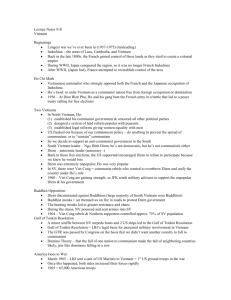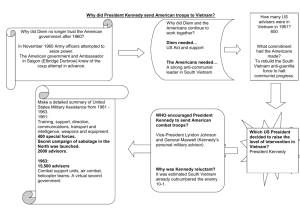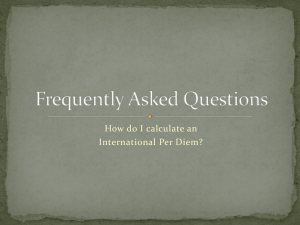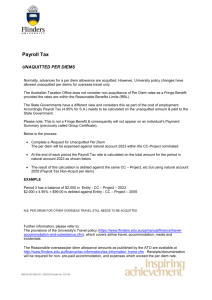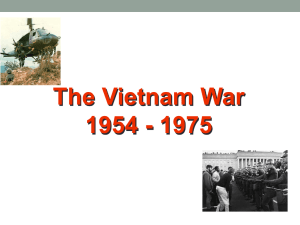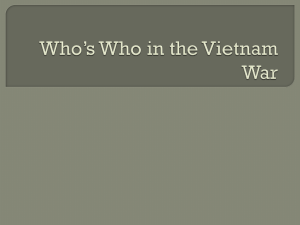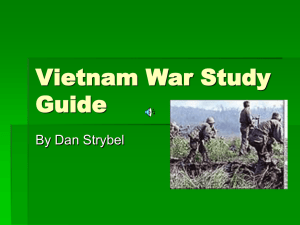Chapter 3 'Sink or Swim, with Ngo Dinh Diem'
advertisement
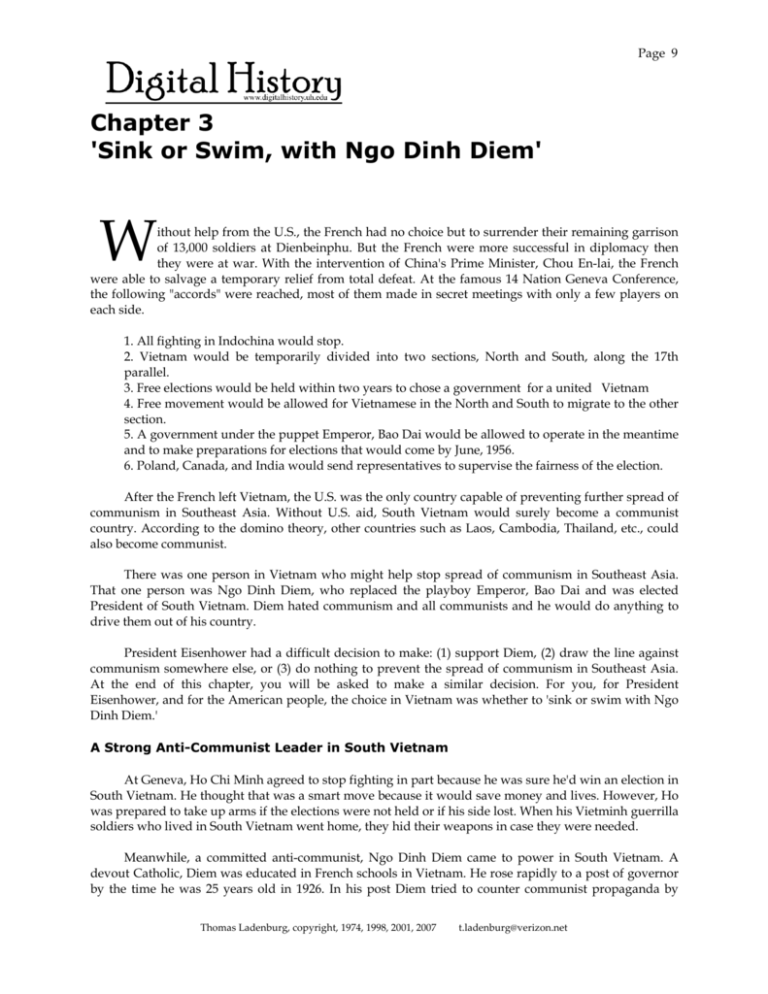
Page 9 Chapter 3 'Sink or Swim, with Ngo Dinh Diem' W ithout help from the U.S., the French had no choice but to surrender their remaining garrison of 13,000 soldiers at Dienbeinphu. But the French were more successful in diplomacy then they were at war. With the intervention of China's Prime Minister, Chou En-lai, the French were able to salvage a temporary relief from total defeat. At the famous 14 Nation Geneva Conference, the following "accords" were reached, most of them made in secret meetings with only a few players on each side. 1. All fighting in Indochina would stop. 2. Vietnam would be temporarily divided into two sections, North and South, along the 17th parallel. 3. Free elections would be held within two years to chose a government for a united Vietnam 4. Free movement would be allowed for Vietnamese in the North and South to migrate to the other section. 5. A government under the puppet Emperor, Bao Dai would be allowed to operate in the meantime and to make preparations for elections that would come by June, 1956. 6. Poland, Canada, and India would send representatives to supervise the fairness of the election. After the French left Vietnam, the U.S. was the only country capable of preventing further spread of communism in Southeast Asia. Without U.S. aid, South Vietnam would surely become a communist country. According to the domino theory, other countries such as Laos, Cambodia, Thailand, etc., could also become communist. There was one person in Vietnam who might help stop spread of communism in Southeast Asia. That one person was Ngo Dinh Diem, who replaced the playboy Emperor, Bao Dai and was elected President of South Vietnam. Diem hated communism and all communists and he would do anything to drive them out of his country. President Eisenhower had a difficult decision to make: (1) support Diem, (2) draw the line against communism somewhere else, or (3) do nothing to prevent the spread of communism in Southeast Asia. At the end of this chapter, you will be asked to make a similar decision. For you, for President Eisenhower, and for the American people, the choice in Vietnam was whether to 'sink or swim with Ngo Dinh Diem.' A Strong Anti-Communist Leader in South Vietnam At Geneva, Ho Chi Minh agreed to stop fighting in part because he was sure he'd win an election in South Vietnam. He thought that was a smart move because it would save money and lives. However, Ho was prepared to take up arms if the elections were not held or if his side lost. When his Vietminh guerrilla soldiers who lived in South Vietnam went home, they hid their weapons in case they were needed. Meanwhile, a committed anti-communist, Ngo Dinh Diem came to power in South Vietnam. A devout Catholic, Diem was educated in French schools in Vietnam. He rose rapidly to a post of governor by the time he was 25 years old in 1926. In his post Diem tried to counter communist propaganda by Thomas Ladenburg, copyright, 1974, 1998, 2001, 2007 t.ladenburg@verizon.net Page 10 writing pamphlets on improving the conditions of the peasants. In 1933 he was appointed Minister of the Interior by the Emperor, Bao Dai, the puppet ruler of Vietnam whose strings were pulled by his French handlers. After three months in his new job, Diem quit because he would not go against the interests of his country. As a result, the French stripped him of his honors and decorations, and Diem went into a selfimposed exile for the next 20 years. He spent most of that time in France and three years in a Catholic monastery in New Jersey where he devoted his time to prayer and doing menial work. But he also met with American and French leaders whom he impressed with his strong anti-Communist views. When the French left Vietnam in 1954, the playboy emperor through whom they had ruled appointed Diem Prime Minister. With help from the U.S., Diem was elected President of South Vietnam. In his new position, Diem had no intention of holding the election promised at the Geneva Agreement because he and President Eisenhower believed would result in a victory for Ho Chi Minh. Diem was too strong an anti-Communist to allow Vietnam be united under Ho, and President Eisenhower was ready to help him as the following excerpts from a letter by the U.S. President to Diem dated October 23, 1954 indicates: DEAR MR. PRESIDENT:. We have been exploring ways and means to permit our aid to Viet-Nam to be more effective and to make a greater contribution to the welfare and stability of the Government of Viet-Nam. I am, accordingly, instructing the American Ambassador to Viet-Nam to examine with you in your capacity as Chief of Government, how an intelligent program of American aid given directly to your Government can serve to assist Viet-Nam in its present hour of trial, provided that your Government is prepared to give assurances as to the standards of performance it would be able to maintain in the event such aid were supplied.1 To strengthen his position in South Vietnam, Diem sent the playboy Emperor back to France. Diem gained control over the army by promoting the generals who President Eisenhower & Secretary of State Dulles welcoming backed his government and firing those who opposed Ngo Dinh Diem to the U.S. him. Diem appointed government officials loyal to him. He made his brother Ngo Dinh Nhu chief of the secret police. Nhu used ten different organizations to find out who supported his brother's government and those who didn't. He even employed spies to spy on other spies. . The Geneva Accord had allowed Vietnamese citizens in the South to move North and those in the North to move South. Altogether 800,000 North Vietnamese, mostly Catholics, moved South. One hundred thousand, mostly Vietminh soldiers from the North, came home. Diem was able to find jobs for the many Catholics who escaped from Ho Chi Minh's government. These displaced Catholics formed the largest single group in South Vietnam that supported Diem. 1 The Department of State Bulletin (November 15, 1954), pp. 735-736. Thomas Ladenburg, copyright, 1974, 1998, 2001, 2007 t.ladenburg@verizon.net Page 11 Anti-Communism Under Ngo Dinh Diem Meanwhile, Diem worked hard to rid South Vietnam of communist influence. Papers suspected of printing news from a communist point of view were closed. The secret police under Diem's brother Nhu informed on disloyal officials. Diem arrested thousands of Vietnamese who he thought supported the Vietminh. Although reliable sources report a far higher number, the South Vietnamese government admitted that 25,000 suspects were thrown in prison. Some of the suspects spent months being 'reeducated' with lessons on the evils of communism. Others were killed or jailed for years. North Vietnam Under Ho Chi Minh Meanwhile, in North Vietnam, Ho Chi Minh and his government engaged in a campaign of terror directed against landlords and men who were suspected of collaborating with the French. Ho Chi Minh had peasants divided into five separate classes ranging from landlord and rich peasants to farm workers. He decided that one out of twenty Ho Chi Minh farmers were landlords and sent officials to ‘liquidate’ them. Their land supposedly would be divided among the other nineteen farm workers. This goal of one in twenty had to be met even if there were no landlords in a particular village. Ho Chi Minh's state terrorism touched off a civil war in many villages. Peasants tried to get on the good side of the government by denouncing others as landlords. Meanwhile opposition to the government was put down without mercy. In Ho's own province 6,000 peasants were killed and/or deported for demonstrating against his government. Furthermore, torture was freely used to root out Vietnamese who had worked for the French and even those whose only crime was not being sufficiently loyal to the Vietminh. Ho Chi Minh later apologized for these and other 'excesses' carried out in North Vietnam, and blamed them on his Chinese advisors. 'Sink or Swim' Although, American leaders were upset by the way Diem ran his government, there was little the U.S. could do about it. If they tried to change Diem, he would complain. He'd say since he was fighting a ruthless enemy in his country and government his tactics were absolutely necessary. As soon as his problems with his communist adversaries were solved, Diem said, he'd go back to respecting the rights of all of his people. As one U.S. official put it, the U.S. had little choice. There was only one strong anti-Communist leader in South Vietnam. There were no other alternatives, except communists. Like him or not, it was 'sink or swim, with Ngo Dinh Diem'. Suggested Student Exercises: 1. After summarizing the main provisions of the Geneva Accord, comment on Eisenhower’s policies toward South Vietnam and Diem. 2. Should the Eisenhower administration have continued supporting No Diem Dinh despite his faults? Why or why not? Thomas Ladenburg, copyright, 1974, 1998, 2001, 2007 t.ladenburg@verizon.net
